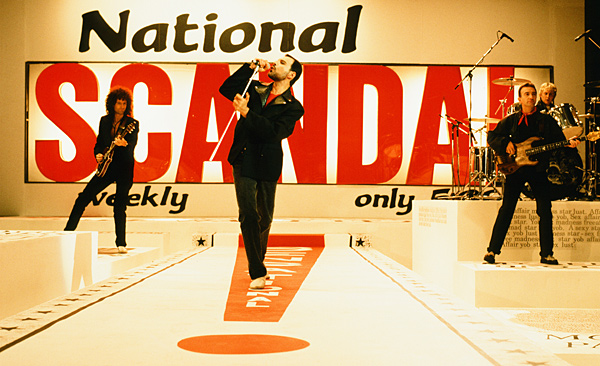Miracle Workers

Queen's 13th studio album, May 1989's The Miracle, has been long overdue for a proper reassessment, and a new eight-disc box set from Hollywood Records dubbed The Miracle Collector's Edition enables our finely attuned ears to do just that. Content supervisors Kris Fredriksson and Justin Shirley-Smith, along with their Miracle Sessions co-producer Joshua J. Macrae, recently all got on the line with me from across the pond to exclusively confirm how The Miracle box set came to be, and why it clearly lives up to its name. If I could only reach you / That would really be a breakthru...

Mike Mettler: Why was The Miracle chosen as the follow-up box set to [October 1977's] News of the World that came out in 2017 as opposed to, say, [November 1975's] A Night at the Opera or [June 1980's] The Game?
Kris Fredriksson: One of the main things that originally drew us to this idea of doing The Miracle was that it's what happened next after where the movie, Bohemian Rhapsody, ends. This box set is the continuation of that, really. [The 2018 Oscar-winning biopic Bohemian Rhapsody essentially tells the Queen story from their early-1970s inception to the band's triumphant performance at Live Aid in July 1985.]
In terms of material, this is one of the longest gaps Queen left between studio albums, so they had a lot of time to write. [June 1986's A Kind of Magic is the LP that preceded The Miracle.] They came in with lots of songs, and lots of ideas for songs. So, the amount of material that came out at the time in terms of B-sides, songs that made later albums, and unreleased songs makes this probably the richest place to start mining the Queen archive. Most albums aren't going to have this much material because that [three-year] gap gave them time to come up with all those ideas.
Justin Shirley-Smith: Yeah, and they were experimenting a lot in the studio as well—just playing together and jamming. Quite a lot of this material came out of that.

Mettler: I really enjoyed hearing all the studio chatter on The Miracle Sessions disc, especially when [lead vocalist] Freddie Mercury is heard "directing" things. For example, on the original take of "I Want It All," he says, "Why don't I try this?" In the video interview footage on the Blu-ray, [bassist] John Deacon mentions the band had been together for 18 years at that point, so what I'm hearing is a certain level of in-studio shorthand and a built-in comfort factor of just knowing what their fellow bandmates would do next. Did you get that feeling when you were listening back to these sessions?
Fredriksson: Oh yeah. That section you mention was a favorite of all of ours, and we were desperate to get it in there. In the studio, Freddie was usually very funny, and quite animated—and, as you say, they followed him so perfectly. He starts to sing a line, and by the time he's gotten to the end of the line, Brian [May, guitarist] is already playing along, and Roger [Taylor, drummer] and John [Deacon, bassist] are very close behind.
Joshua J. Macrae: It happens all so quickly, doesn't it?
Fredriksson: Yeah, it does. And when the band heard it, they were really keen for people to hear that chatter—and so were we. Basically, we went through every single multitrack tape that had anything to do with this album for people to hear that. We isolated moments where there was nice interaction—not just the talking, but also the musical moments, the most different versions of these songs, and, obviously, the songs that hadn't been heard before. We pieced this box set together based on all that. For each of those songs, there are many different versions with different arrangements or something like a middle-eight coming in a different place.
Shirley-Smith: There's one song, "The Invisible Man (Early Version)," where we included a middle-eight that was taken out entirely.
Fredriksson: Right, and sometimes there were versions with alternate lyrics—but none of those things happened all at once on the same tape. That's why it took such a long time just to sift through everything. And it's not just a case of, "Oh, that's different." It's gotta actually work.
Macrae: You also have to apply your musical brain and taste as well, as a producer. I mean, you could easily have ten different versions of some of these songs, so this box set is actually a distillation of what we all heard.
Fredriksson: Like Brian [May] said, it's like being in a parallel universe—an alternative universe.

Mettler: You mentioned accessing the original multitrack tapes. Where were they, and what kind of storage system do you have for those tapes? How did you bring The Miracle back to life?
Shirley-Smith: Well, we can't tell everybody where it's all stored! (all laugh)
Fredriksson: The thing we can say about it is that they're stored in a very secure environment. I mean, it's basically built to withstand a dirty bomb. There are multiple locations, actually, and they all have fire-suppression systems in them that will suck the oxygen out of the room if a fire is detected, rather than flooding it with water. We tend to work in there with the door open.
Shirley-Smith: A lot of thought has gone into our process, in terms of any Queen project we approach. All the original tapes come out, and they all get copied onto our working systems. Everything's digitized.
Macrae: Obviously, we have played the original tapes beyond just transferring them, but a lot of them have already been transferred.
Fredriksson: Everything's being preserved for the future by moving it onto new formats that are more malleable, rather than playing the original tapes over and over again.

Mettler: I'm glad to hear that, because we all saw what almost happened to the original tape of "Bohemian Rhapsody" [the epic worldwide No. 1 single from the aforementioned A Night at the Opera]. One more razor cut, and it would have disintegrated.
Fredriksson: You're right. They had to copy that tape to keep working on that song, literally. There is a tape in that condition, and the tape they ended up using is in better condition because they had to copy it onto that one.
Mettler: Who knows what would have happened to that song if they didn't copy it? Anyway, one more thing. It's probably hard to pick just one, but is there a track from The Miracle collection each of you now have more affinity for after working on this box set, whether it's the original or an alternate version?
Macrae: Well, I like "Breakthru (Real Drums and Bass)," because it has such a different feel.
Shirley-Smith: Yeah, I agree. I love the sound of the bass and drums on there. I like the original track, but I dunno—it's like a bluesier version, or something.
Macrae: It's a great rhythm section they've got going on that one.
Fredriksson: I have to agree with that. That's a real highlight, with that rhythm section going on there.
Shirley-Smith: Exactly. It's less machine drums, and more real drums.
Fredriksson: There are quite a few machine drums on the album, and one of the things we were doing was to show the real drums that were there and lurking in the background. We wanted to focus more on the humans, rather than machines.
Shirley-Smith: We were taking The Miracle all back to humans! (all laugh)
- Log in or register to post comments















































